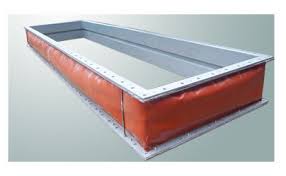
Fabric expansion joints are made using single or multiple layers of fabrics and elastomers. These are primarily used for applications that involve high temperatures and low pressures. These joints help in maintaining structural integrity, preventing leaks, and accommodating thermal expansion and contraction. Some of the benefits of using fabric expansion joints in industrial applications are as follows:

Insulation And Protection Against Mechanical Loads
These expansion joints are designed to provide insulation to safeguard applications against mechanical loads. They are made using sturdy materials so that they can withstand extreme temperatures and harsh chemicals. For this reason, these expansion joints are widely used by pipe expansion joints manufacturers, chemical processing plants and any other place where high-temperature fluids are transported through pipes.
Absorption Of Movements In Multiple Directions
These elastomeric strip seal expansion joints can absorb movement in multiple directions. It is essential for dealing with structures that face thermal expansion or contraction due to temperature changes. These joints absorb vibration due to machinery operations and minimise noise levels.
Space-Efficient Design
Fabric expansion joints have space space-efficient design and they take up much less space than conventional metallic connectors. These joints are much lighter than traditional bellows. They minimise the footprint required for the installation of the joint.
Minimal Reactive Forces
These expansion joints produce minimal reactive forces during thermal expansion and minimise the risk of damage or structural failure. It also improves the safety and longevity of equipment, as well as the expansion joint. It also reduces stress on pumps and valves.
Features
- Compensating for large movements over a short length
- Absorbing simultaneous movements in multiple planes
- Noise and vibration resistance
- Corrosion-resistant materials
- Easy installation and maintenance
- Very low cost of replacement
- Design freedom
- Thermal break
Key Considerations
When it comes to picking appropriate expansion joints, there are many different types of fabric expansion joints designed to meet varied needs. User must select the style that suits their specific application to eliminate the risk of asset leaks and failures. Here are some of the key considerations for picking the appropriate expansion joint to suit your application requirements
Operating temperature: Determine the temperature range of the system and select materials that help in maintaining mechanical properties within the given temperature range.
Movement requirements: One should assess the expected movement of the piping system, such as thermal, vibration and seismic and choose an expansion joint able to accommodate the required range of motions.
Chemical And Heat Compatibility With Process Gases
Evaluate how corrosive the chemicals that will be in contact with the materials are. Also, determine the temperature range of the system and select the materials that can maintain their mechanical integrity.
Environmental conditions
It is important to evaluate the size and configuration of the ductwork and then evaluate if the expansion is required for being delivered as a single unit. One must also take into account considerations such as labor costs and ease of installation.
Compliance with industry standards and regulations
By carefully evaluating these factors and consulting with experienced engineers or manufacturers, users can choose the most suitable fabric expansion joints to ensure reliable operation and minimise maintenance costs.
AFS Joints for Fabric Expansion Joints
AFS Joints is a trusted name in the industry, known for delivering high-quality fabric expansion joints designed to meet the demanding needs of modern infrastructure. These joints play a critical role in ducting systems. These joints absorb movement caused due to thermal expansion, vibration, and mechanical changes. AFS fabric expansion joints are engineered with precision, using advanced materials that offer exceptional durability, chemical resistance, and flexibility.
Whether used in power plants, chemical facilities, refineries, or HVAC systems, AFS joints ensure reliable performance even under extreme conditions. They create expansion joints customised to deal with high temperatures and aggressive environments, extending the life of ducting systems and reducing maintenance costs. With a focus on innovation and quality, AFS combines technical expertise with strict manufacturing standards to deliver solutions that meet both operational and safety requirements.
Each fabric expansion joint from AFS is meticulously engineered with the end-user’s specific needs in mind. These joints are designed for straightforward installation, reducing labor costs and project timelines. Built with high-quality materials and advanced manufacturing techniques, they ensure a long service life even in demanding environments, minimizing the need for frequent replacements or maintenance interventions and helping plants avoid costly, unplanned downtime.
In addition to their standard product offerings, AFS specializes in custom design services. Their team of experienced engineers collaborates closely with clients to develop tailor-made solutions that address unique operating conditions, such as high temperatures, corrosive media, or space constraints. This commitment to customization ensures that every application benefits from the most effective and efficient joint solution possible.
When performance, reliability, and safety are critical, AFS stands out as a trusted partner in the industry. Their fabric expansion joints are not only built to handle the technical demands of modern industrial systems but also deliver lasting value by enhancing system efficiency, protecting equipment, and ensuring operational continuity. With AFS, customers can have confidence in solutions that truly support long-term success.




